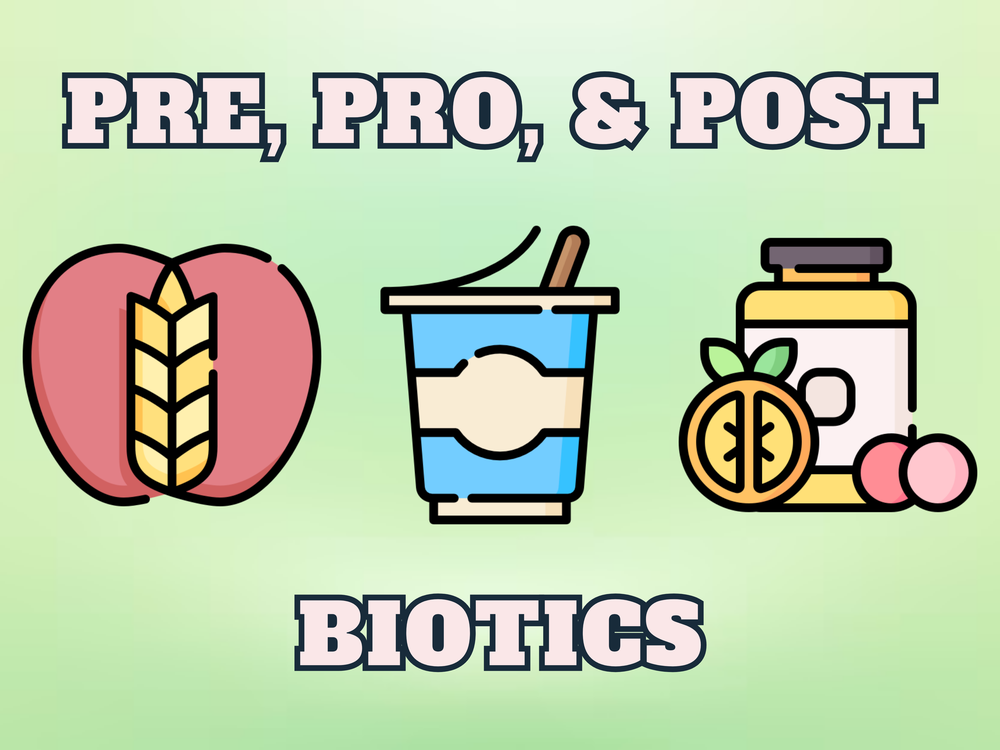
What Are They?
Probiotics. Probiotics. Postbiotics. These are likely all words you've heard of. But if you're like me, then you constantly confuse these 3, and you're not sure what each one is.

While these 3 are each different things, they all share 1 things in common: they're important for your gut microbiome. So what exactly are pre, pro, and post biotics, and where can I get them?
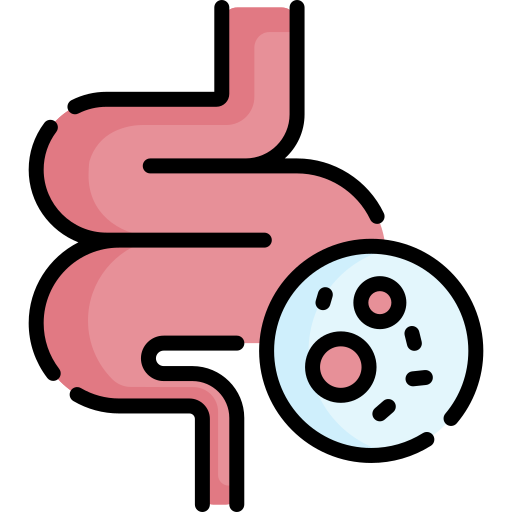
About Gut Health
To start, let's quickly go over what the gut microbiome is. Our guts are filled over 100 trillion bacteria, both good and bad. A healthy gut has strong good gut bacteria, whereas an unhealthy gut has the opposite.
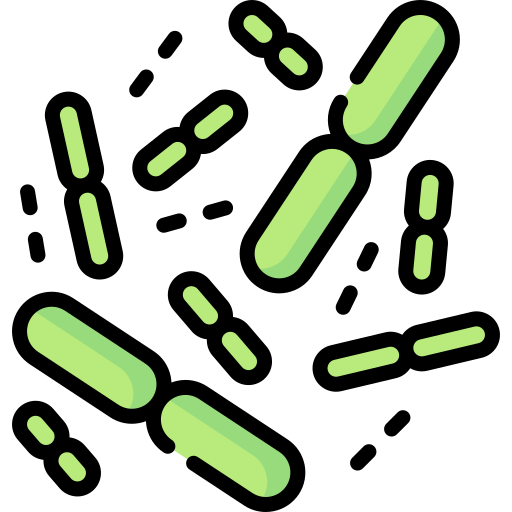
Gut health is growing in attention as of late, as we begin to uncover the secrets behind the gut-brain connection. To vastly over simplify, many chronic conditions can be traced back to the gut, and keeping it healthy can prevent many long term issues, such as diabetes, Alzheimer's, and cancer.

Gut health is vital to our overall wellbeing. Our body and gut has a symbiotic relationship, where the gut benefits our health if we provide it with the right nutrients. This includes aiding in proper digestion, nutrient absorption, detoxification, energy production, and more.
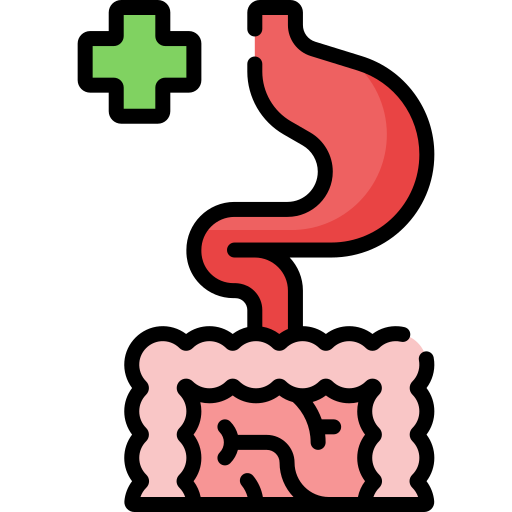
While it is difficult to measure exactly if you have a healthy gut or not, what is clear is that you should consume minimally processed, nutrient dense, whole foods to support a beneficial microbiome. Failing to do so can lead to a condition known as "intestinal permeability", also known as "leaky gut".

On Leaky Gut
Leaky gut is likely the root cause of many gastrointestinal conditions, such as IBS, IBD, heart burn, acid reflux, and perhaps Celiac disease. It can also lead to many other conditions, such as insulin resistance, PCOS, dementia, diabetes, arthritis, lactose intolerance, and eczema, just to name a few.

Some common symptoms of leaky gut are bloating, indigestion, diarrhea, nausea, brain fog, fatigue, and food allergies. This takes us back to pre, pro, and post biotics, which are often used to treat and prevent these conditions from occuring.

What Are Prebiotics?
Prebiotics are essentially a fancy word for fiber. In short, most fruits, vegetables, nuts, beans, seeds, and whole grains are good sources of prebiotics, because they all contain ample amounts of dietary fiber.

Fiber is not food for us; it is instead food for our guts. Despite being classified as a complex carb, fiber contains no calories, as our bodies do not break them down for energy. Instead, fiber fuels our good gut bugs.

Despite being the easiest of the 3 to get, the majority of Americans are defient in prebiotics, and most people are consuming much less fiber than they should be. USDA guidelines recommend about 25 g a day of fiber for women and 30 g for men, which is too low in my opinion.

For comparison, the average American struggles to even hit 15 g per day. Chronic deficiencies in fiber, coupled with a diet high in refined sugar and starch, leads the gut to instead feed off the intestinal wall, causing leaky gut.
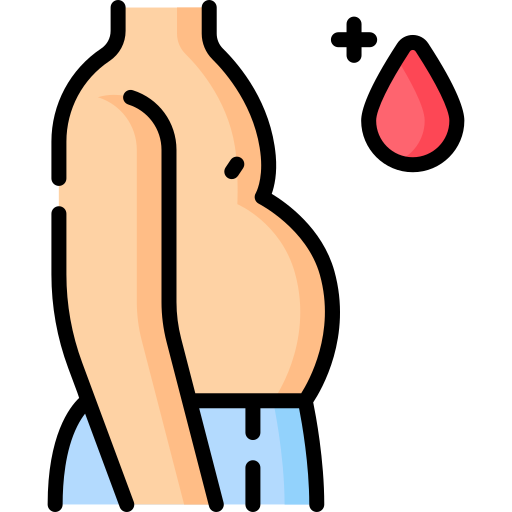
Prebiotics: Examples
What Are Probiotics?
On the other hand, probiotics are foods that contain good bacteria. These are your fermented foods, like Greek yogurt, sauerkraut, kimchi, kefir, and kombucha to name a few. Whereas prebiotics strengthen your current good bacteria, probiotics provide more good bugs to bolster the existing microbiome.
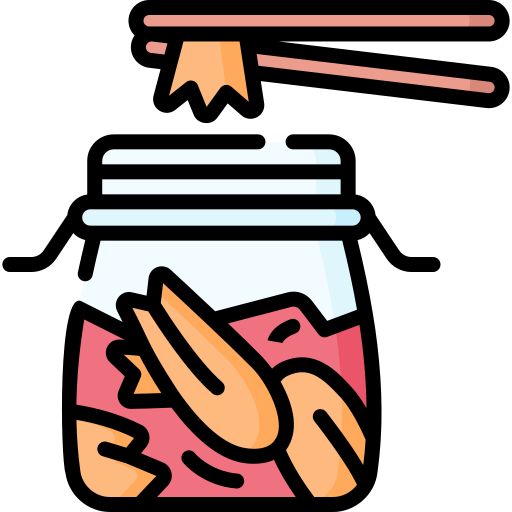
Probiotics are harder to naturally get, as you tend to have to go out of your way to consume them. I usually just add a spoonful of sauerkraut to nearly any savory dish I'm eating, whether it be a salad, bowl, stew, or just as a side. As for sweet meals, I'm a big Greek yogurt for breakfast guy, always mixing it with oatmeal, nut butter, protein powder, and more.

It's very easy to combine together both pre and pro biotics in 1 meal. Think about whenever you can fiber and fermented foods together. Eat a bowl of Greek yogurt with fruit and nuts, drink a glass of sugar free kefir or kombucha with lunch, or add some sauerkraut or kimchi on top of your dinner.
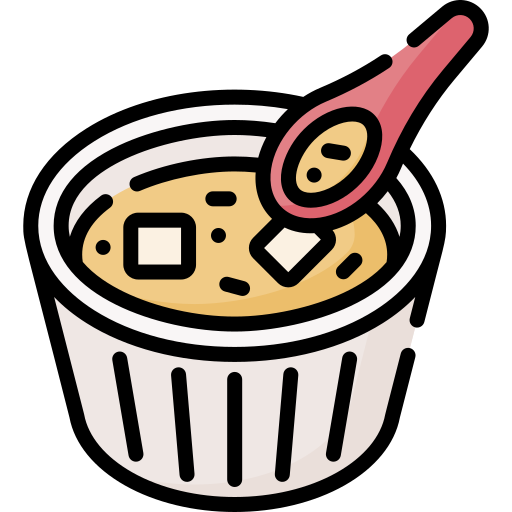
Probiotics: Examples
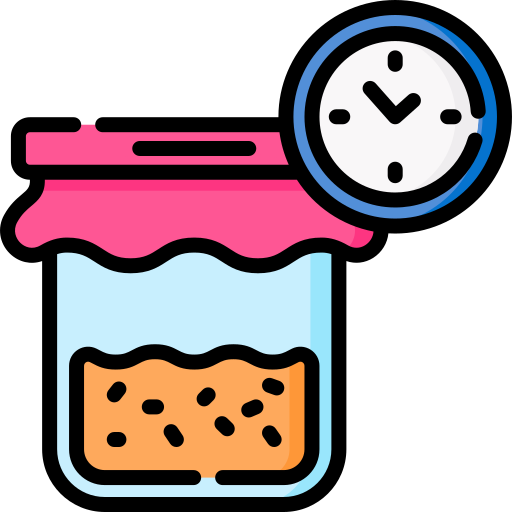

What Are Postbiotics?
Finally, we have postbiotics. As opposed to prebiotics and probiotics, postbiotics are typically not obtained through food alone. Instead, these are typically only obtained through supplementation.

Postbiotics are what's produced by your gut after consuming prebiotics and probiotics. As your body breaks down fiber, the body produces beneficial postbiotics, like vitamins, minerals, amino acids, and short-chain fatty acids (SCFAs).

Essentially, a daily multivitamin is a good example of a low grade postbiotic. Yes, you consume vitamins and minerals through the food you eat (I hope), but it doesn't hurt to add in a little bit more.

Conclusion
At the end of the day though, it's best to keeps supplements as, well, supplemental. They should be in addition to a minimally processed diet, not in place of one. Adequate consumption of prebiotics, probiotics, and postbiotics should come naturally with a whole foods diet, without much supplementation.

TL;DR

Sources
Probiotics. Probiotics. Postbiotics. These are likely all words you've heard of. But if you're like me, then you constantly confuse these 3, and you're not sure what each one is.

While these 3 are each different things, they all share 1 things in common: they're important for your gut microbiome. So what exactly are pre, pro, and post biotics, and where can I get them?

About Gut Health
To start, let's quickly go over what the gut microbiome is. Our guts are filled over 100 trillion bacteria, both good and bad. A healthy gut has strong good gut bacteria, whereas an unhealthy gut has the opposite.

Gut health is growing in attention as of late, as we begin to uncover the secrets behind the gut-brain connection. To vastly over simplify, many chronic conditions can be traced back to the gut, and keeping it healthy can prevent many long term issues, such as diabetes, Alzheimer's, and cancer.

Gut health is vital to our overall wellbeing. Our body and gut has a symbiotic relationship, where the gut benefits our health if we provide it with the right nutrients. This includes aiding in proper digestion, nutrient absorption, detoxification, energy production, and more.

While it is difficult to measure exactly if you have a healthy gut or not, what is clear is that you should consume minimally processed, nutrient dense, whole foods to support a beneficial microbiome. Failing to do so can lead to a condition known as "intestinal permeability", also known as "leaky gut".

On Leaky Gut
Leaky gut is likely the root cause of many gastrointestinal conditions, such as IBS, IBD, heart burn, acid reflux, and perhaps Celiac disease. It can also lead to many other conditions, such as insulin resistance, PCOS, dementia, diabetes, arthritis, lactose intolerance, and eczema, just to name a few.

Some common symptoms of leaky gut are bloating, indigestion, diarrhea, nausea, brain fog, fatigue, and food allergies. This takes us back to pre, pro, and post biotics, which are often used to treat and prevent these conditions from occuring.

What Are Prebiotics?
Prebiotics are essentially a fancy word for fiber. In short, most fruits, vegetables, nuts, beans, seeds, and whole grains are good sources of prebiotics, because they all contain ample amounts of dietary fiber.

Fiber is not food for us; it is instead food for our guts. Despite being classified as a complex carb, fiber contains no calories, as our bodies do not break them down for energy. Instead, fiber fuels our good gut bugs.

Despite being the easiest of the 3 to get, the majority of Americans are defient in prebiotics, and most people are consuming much less fiber than they should be. USDA guidelines recommend about 25 g a day of fiber for women and 30 g for men, which is too low in my opinion.

For comparison, the average American struggles to even hit 15 g per day. Chronic deficiencies in fiber, coupled with a diet high in refined sugar and starch, leads the gut to instead feed off the intestinal wall, causing leaky gut.

Prebiotics: Examples
- Alliums
- Chives
- Garlic
- Leeks
- Onions
- Scallions
- Shallots
- Dark leafy greens
- Arugula
- Kale
- Lettuce
- Mustard greens
- Spinach
- Swiss chard
- Fruits
- Apples
- Avocados
- Berries
- Coconut
- Melons
- Oranges
- Legumes
- Beans
- Edamame
- Lentils
- Peanuts
- Peas
- Tofu
- Other vegetables
- Asparagus
- Beets
- Broccoli
- Carrots
- Eggplant
- Mushrooms
- Nuts
- Almonds
- Brazil nuts
- Cashews
- Macadamia nuts
- Pistachios
- Walnuts
- Seeds
- Chia seeds
- Flax seeds
- Hemp seeds
- Pumpkin seeds
- Sesame seeds
- Sunflower seeds
- Starchy vegetables
- Parsnips
- Plantains
- Potatoes
- Pumpkin
- Squash
- Sweet potatoes
- Whole Grains
- Barley
- Brown rice
- Corn
- Millet
- Oats
- Quinoa
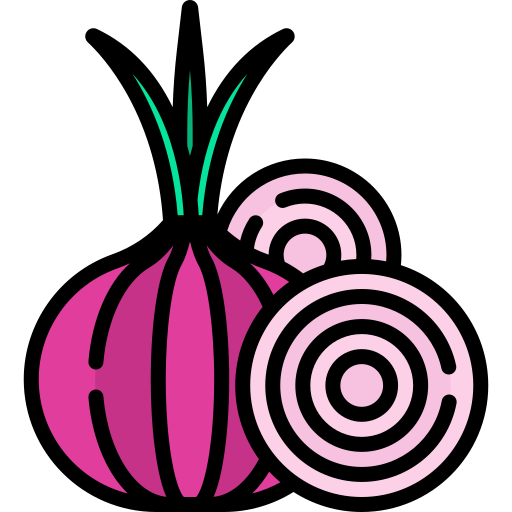
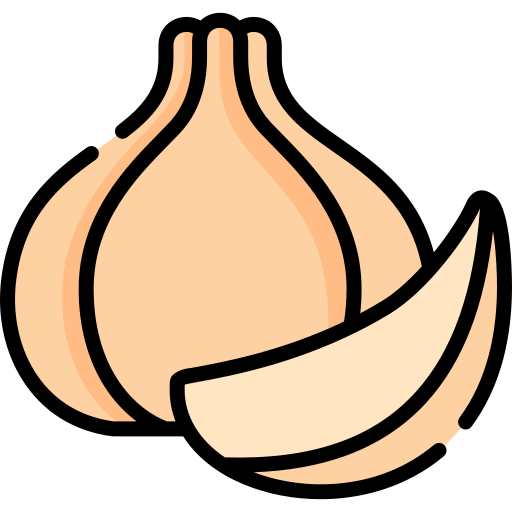
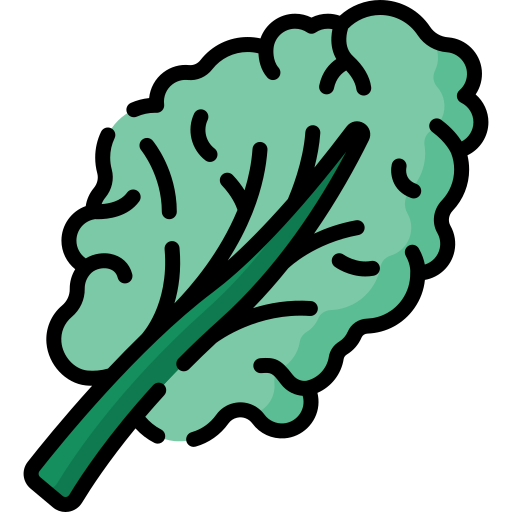




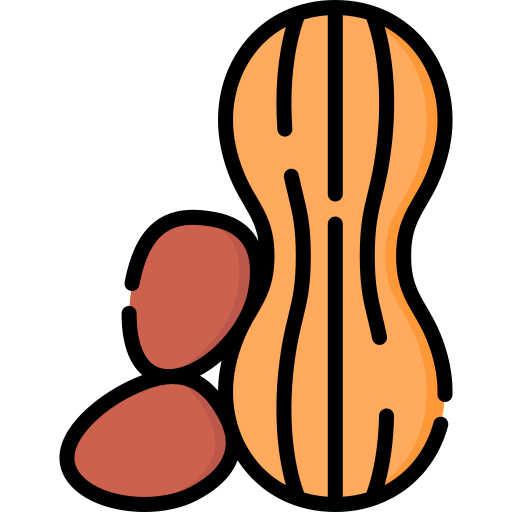



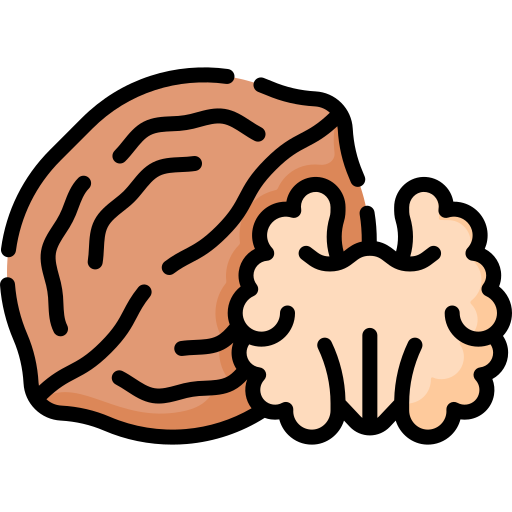


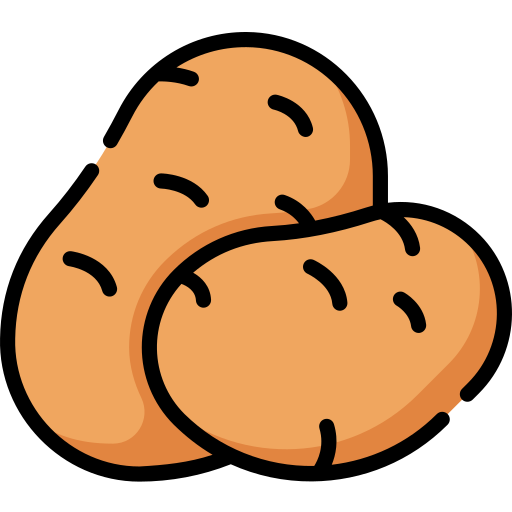

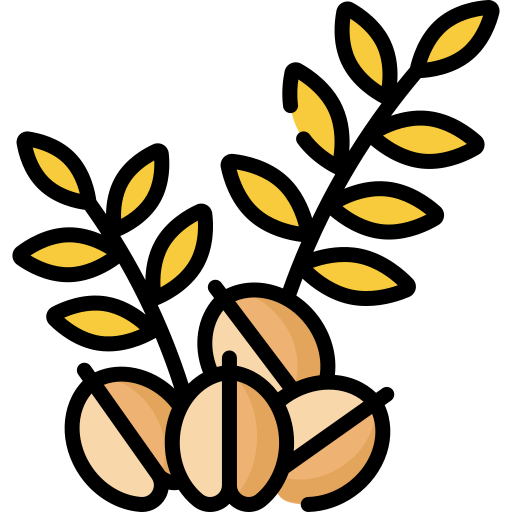

What Are Probiotics?
On the other hand, probiotics are foods that contain good bacteria. These are your fermented foods, like Greek yogurt, sauerkraut, kimchi, kefir, and kombucha to name a few. Whereas prebiotics strengthen your current good bacteria, probiotics provide more good bugs to bolster the existing microbiome.

Probiotics are harder to naturally get, as you tend to have to go out of your way to consume them. I usually just add a spoonful of sauerkraut to nearly any savory dish I'm eating, whether it be a salad, bowl, stew, or just as a side. As for sweet meals, I'm a big Greek yogurt for breakfast guy, always mixing it with oatmeal, nut butter, protein powder, and more.

It's very easy to combine together both pre and pro biotics in 1 meal. Think about whenever you can fiber and fermented foods together. Eat a bowl of Greek yogurt with fruit and nuts, drink a glass of sugar free kefir or kombucha with lunch, or add some sauerkraut or kimchi on top of your dinner.

Probiotics: Examples
- Apple cider vinegar (with the mother)
- Buttermilk
- Greek yogurt
- Kefir
- Kimchi
- Kombucha
- Miso
- Natto
- Sauerkraut
- Soft cheeses
- Tempeh


What Are Postbiotics?
Finally, we have postbiotics. As opposed to prebiotics and probiotics, postbiotics are typically not obtained through food alone. Instead, these are typically only obtained through supplementation.

Postbiotics are what's produced by your gut after consuming prebiotics and probiotics. As your body breaks down fiber, the body produces beneficial postbiotics, like vitamins, minerals, amino acids, and short-chain fatty acids (SCFAs).

Essentially, a daily multivitamin is a good example of a low grade postbiotic. Yes, you consume vitamins and minerals through the food you eat (I hope), but it doesn't hurt to add in a little bit more.

Conclusion
At the end of the day though, it's best to keeps supplements as, well, supplemental. They should be in addition to a minimally processed diet, not in place of one. Adequate consumption of prebiotics, probiotics, and postbiotics should come naturally with a whole foods diet, without much supplementation.

TL;DR
- Prebiotics = dietary fiber
- Probiotics = fermented foods
- Postbiotics = vitamins, minerals, and supplements

Sources
- FlatIcon
- Standford: Probiotics, Prebiotics, and Postbiotics: What Are They and Why Are They Important?
- Cleveland Clinic: Leaky Gut Syndrome
- UCSF: Increaing Fiber Intake
- PubMed: Probiotics, prebiotics, and postbiotics in health and disease
- MedicineNet: Prebiotics vs. Probiotics vs. Postbiotics - What's the Difference?